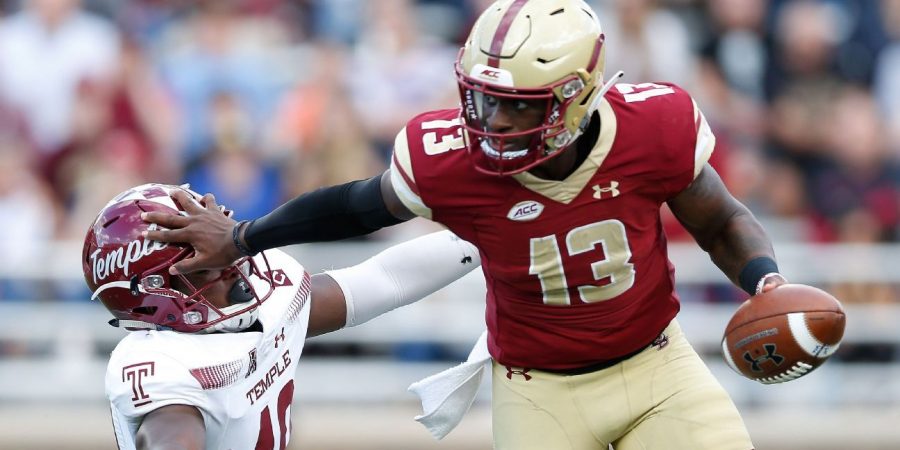Who says it’s been a sleepy offseason?
Though the spread of the coronavirus has understandably brought this country and the rest of the world to a grinding halt, there is still movement taking place as it relates to roster management and talent acquisition in the world of college football.
That was proven true Wednesday afternoon, after multiple news outlets reported that former Boston College starting quarterback Anthony Brown has made the decision to head to Oregon as a grad transfer for the 2020 season. Similar to the arrival of Juwan Johnson last season, Brown is expected to be immediately eligible entering his final year as a collegian.
Sources: Graduate transfer quarterback Anthony Brown will choose Oregon for his final year of eligibility. He was a three-year starter at Boston College.
— Pete Thamel (@PeteThamel) April 1, 2020
A three-year starter with the Eagles, Brown completed 54.8 percent of his passes for 4,738 yards, 40 touchdowns, and 20 interceptions, leaving Boston College with an average passing efficiency rating of 130.95 for his career, which would have ranked him 10th out of 11 eligible quarterbacks in the Pac-12 last season. It’s worth noting, however, that Brown was playing some of his best football of his career prior to suffering a knee injury six games into the 2019 season, finishing the year completing 59.1 percent of his passes for 1,250 yards, nine touchdowns, two interceptions, and a passing efficiency rating of 154.52. It was second time in Brown’s career that he suffered a knee injury that sidelined him for the season (torn ACL in 2017).
Formerly a three-star recruit per 247Sports’ Composite ratings, the Cliffwood, N.J. native originally chose Boston College over offers from Syracuse, Virginia Tech, Wake Forest, and others.
Below we take a closer look at Brown’s game, examining his weaknesses and strengths, as well as projecting how he may make an impact for the Ducks when he ultimately arrives on campus.
Notable weaknesses:
- Has struggled with accuracy throughout career: For all the raw tools that Brown possesses, he demonstrated only marginal improvement in terms of his accuracy over three years as the starter in Chestnut Hill. Brown’s career completion percentage is just 54.8 percent, with his best season from a completion percentage standpoint coming during an injury-shortened 2019 campaign (59.1). If Brown hopes to unseat Shough in 2020, he’ll need to increase that mark considerably.
- Injury prone: Unfortunately for Brown, injuries have largely robbed him of the opportunity to develop and improve year-over-year. After showing tremendous promise as a redshirt freshman in 2017, a torn ACL in his right knee ended Brown’s season after 10 games. A healthy 2018 season gave way to a 2019 campaign that offered plenty of promise, but a left knee injury suffered at Louisville ended his season after only six games.
Notable strengths:
- Dynamic rushing threat: Brown’s athletic gifts are apparent the moment you see him move within and outside of the pocket. His ability to elude pressure or threaten defenses on designed runs make him a nice fit for the offense Moorhead has preferred to run at his previous stops. Even if he doesn’t win the starting job outright, it’s possible that Brown could have a role in special packages that look to take advantage of his athleticism.
- Quick release, good arm strength: Brown isn’t a one-trick pony when it comes to the problems he poses at quarterback. Though his efficiency could stand to improve, Brown demonstrates a quick, compact release and has enough arm strength to challenge defenses down the field. He showed flashes of impressive dual-threat ability prior to his season-ending injury last year and should offer quality competition in his head-to-head battle with Tyler Shough for QB1 this fall.
- Experience as a starter: This is one area where Brown has a distinct advantage over every other quarterback on the Oregon roster. With 28 career appearances under his belt, there isn’t a lot that will catch Brown by surprise as he arrives in Eugene looking to snatch the starting quarterback job.
Overall outlook:
The addition of Anthony Brown had been something that was long-rumored for the past few months. Though the timing feels slightly odd given the fact that spring practices (including the spring game) have been canceled due to the coronavirus pandemic, the expectation is that Brown will, at the very least, offer stiff competition for redshirt sophomore Tyler Shough and a level of insurance should Shough win the job but get injured. In some respects, Brown’s decision to come to Oregon is a considerable gamble on his part, as the opportunity to start is far from guaranteed given the competition that already exists on the roster between him, Shough, redshirt freshman Cale Millen, and true freshmen Jay Butterfield and Robby Ashford. Additionally, Brown will have limited opportunities to get acclimated to the program and apply the playbook in practice, not only with the coronavirus threatening to impact fall camp and the start of the season, but with Brown also coming off a surgically-repaired knee that will be largely untested whenever normalcy resumes. With all that said, nothing feels all that guaranteed for any of the contenders in the race for the starting quarterback job this fall. Given Brown’s wealth of experience and his perceived fit as a dual-threat quarterback in first year offensive coordinator Joe Moorhead’s scheme, Duck fans should expect Brown to figure prominently in the quarterback battle that we all hope is waged later this summer.
Top Photo: Former Boston College QB Anthony Brown (Photo: Tim Bradbury/Getty Images North America)

